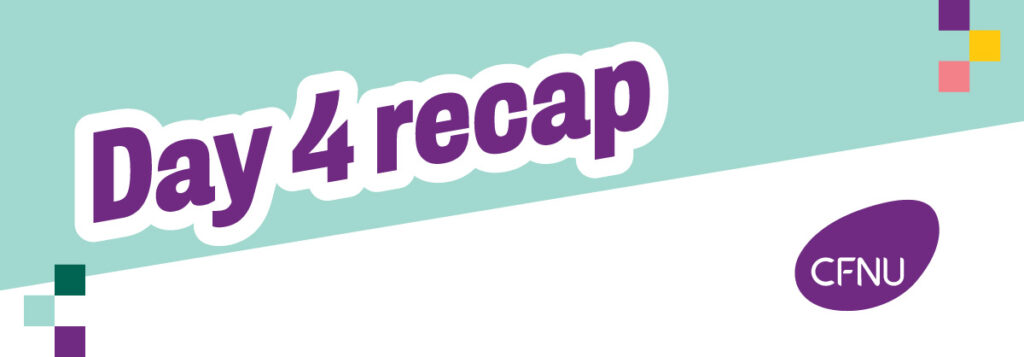
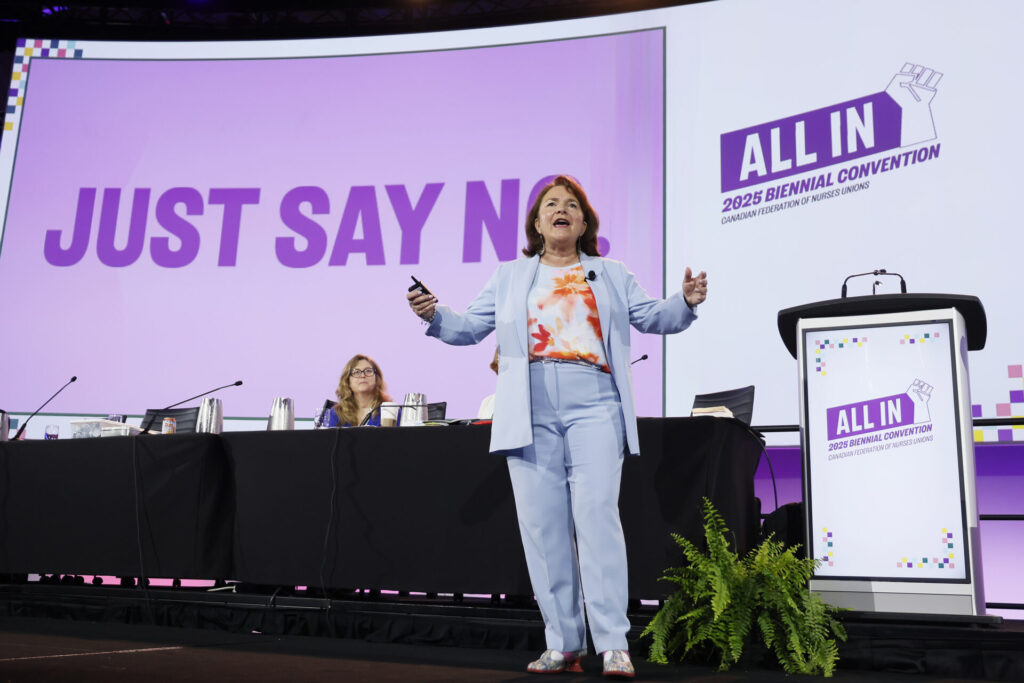
“It’s time to grow our movement – to fight boldly for the change nurses and patients desperately need,” declared CFNU President Linda Silas to close to 1,200 nurse delegates from across the country.
“We keep saying ‘yes’, covering for each other’s exhaustion, patching leaks in a broken system,” said Silas. “Now, we’re going to say ‘no’. No to employers who don’t condemn violence, no to unsafe staffing, to being silenced, dismissed or ignored. One small word with enormous power – no apologies, no explanations. Because this fight – our fight – is bigger than any one nurse or any one union.”
Silas called for members to join this national movement based on respect, fairness, social justice and safety, that pushes back against a broken health care system that undervalues nursing.
Changing the culture and changing the story of nursing in Canada starts with empowering nurses to stand up for themselves and for their profession – and say ‘no’.
“You are unionized nurses, and you have rights. It’s about solidarity, it’s about strength,” she said. “It is about changing the culture.”
The CFNU and national, regional and local leaders are committed to this mission, to telling the story of the challenges faced and overcome by the bold generations of nurses in provinces across Canada.
Silas highlighted the ways which nurses across Canada have been standing up for what’s right – for themselves and their patients. From setting the benchmark for equity in health care to safeguarding from privatization and directly implementing policy, nurses’ unions are on the front lines of change.
Silas spoke about the bold and fierce generations of nurses who have brought the nursing profession to where it is today, and created the path that nurses today continue to forge.
“We’re going to spark a new kind of solidarity. One that goes beyond traditional labour models and speaks to the reality of today’s nursing world,” she said. “This vision needs to be deeply grounded in Indigenous teachings. It’s important that we learn from the wisdom and experiences of the seven generations before us, and act in ways that will protect and nurture the seven generations to come.”
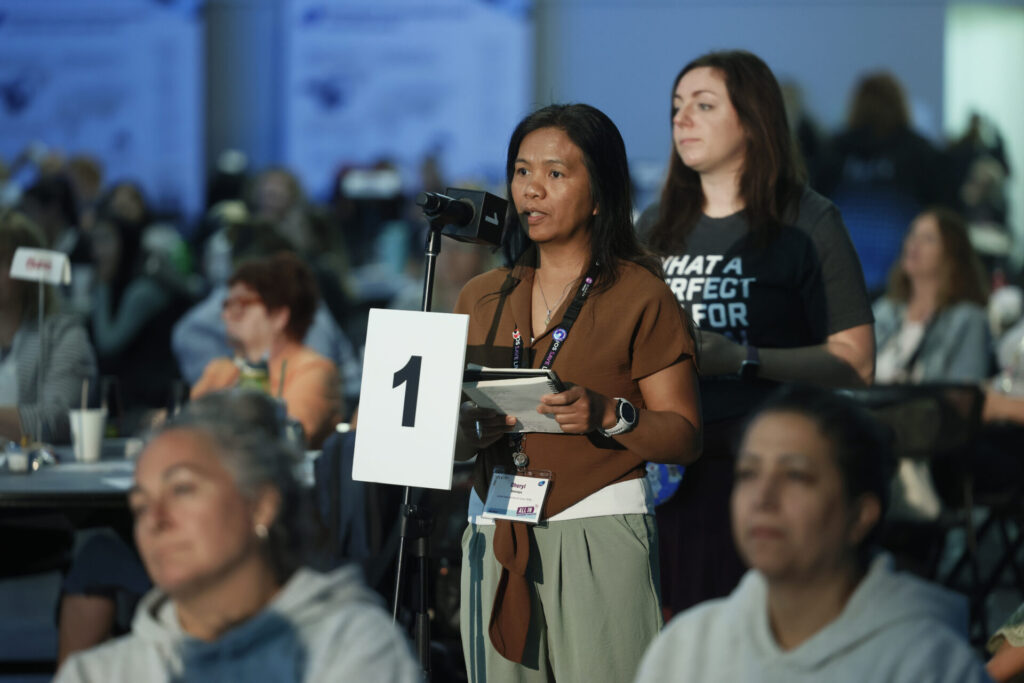
What happens when Canada’s nursing leaders unite in one room? You get passion. You get expertise. Most importantly, you get action.
That was evident during an open forum with the CFNU National Executive Board. A packed room of delegates listened closely as union presidents from across the country shared hard truths, emotional stories and bold ideas about how to move health care forward.
Throughout the conversation, leaders returned to these themes: staffing, safety and the growing threat of privatization.
Yvette Coffey of Newfoundland and Labrador didn’t hold back. “There’s no damn way this can continue,” she said, referring to the staffing crisis governments have ignored for decades.
But there were glimmers of hope. She pointed to the travel locum pilot program in Labrador as one example of innovation that is now expanding to other areas of her province.
When the topic shifted to privatization, Paula Doucet of New Brunswick delivered a statement that captured the heart of the discussion.
“Health care is not an expense. Funding health care is an investment.”
Others echoed her concerns. The rise of costly private agency nurses, many of whom are unfamiliar with local systems, is eroding care quality and diverting critical resources away from public health care and from the staff who hold it together.
When the conversation turned to burnout and workplace violence, the tone grew even more urgent. Janet Hazelton of Nova Scotia described a troubling shift in how nurses are treated.
“Post-COVID, we have a form of McDonald’s health care system,” she said. “If people don’t get the care they demand ASAP, they take it out on the nurses.”
She called for automatic charges for violent patients, removing the onus from nurses to press charges themselves.
In Saskatchewan, nurses are sharing the raw, unfiltered truth, and it’s making an impact.
By collecting and publicly sharing anonymous stories straight from the front lines, SUN has given nurses a powerful voice. The stories are honest, emotional and unedited. And they’ve struck a nerve. When government and health authorities asked them to stop, their answer was clear: “Hell no.”
This bold approach has sparked a surge in member engagement, with previously silent nurses stepping forward to become outspoken champions for change.
But it wasn’t all about today’s challenges. Leaders also looked to the future.
Heather Smith and Danielle Larivee from Alberta shared wins from the United Nurses of Alberta’s latest collective agreement, which now includes strong language on safe staffing and workload.
Opeyemi Kehinde, representing the Canadian Nursing Students’ Association, reminded everyone that the next generation is also struggling.
“When students in the medical profession are paid for their placements, nursing students deserve the same thing. Enough is enough.”
Panelists and delegates all called for stronger enforcement, more visible public advocacy and a united front to counter the myths around privatization.
As CFNU President Linda Silas reminded the room, “The strength of the CFNU lies in all of you.”
Canada’s nursing leaders are all in. And judging by the energy in the room, so are the nurses they represent.
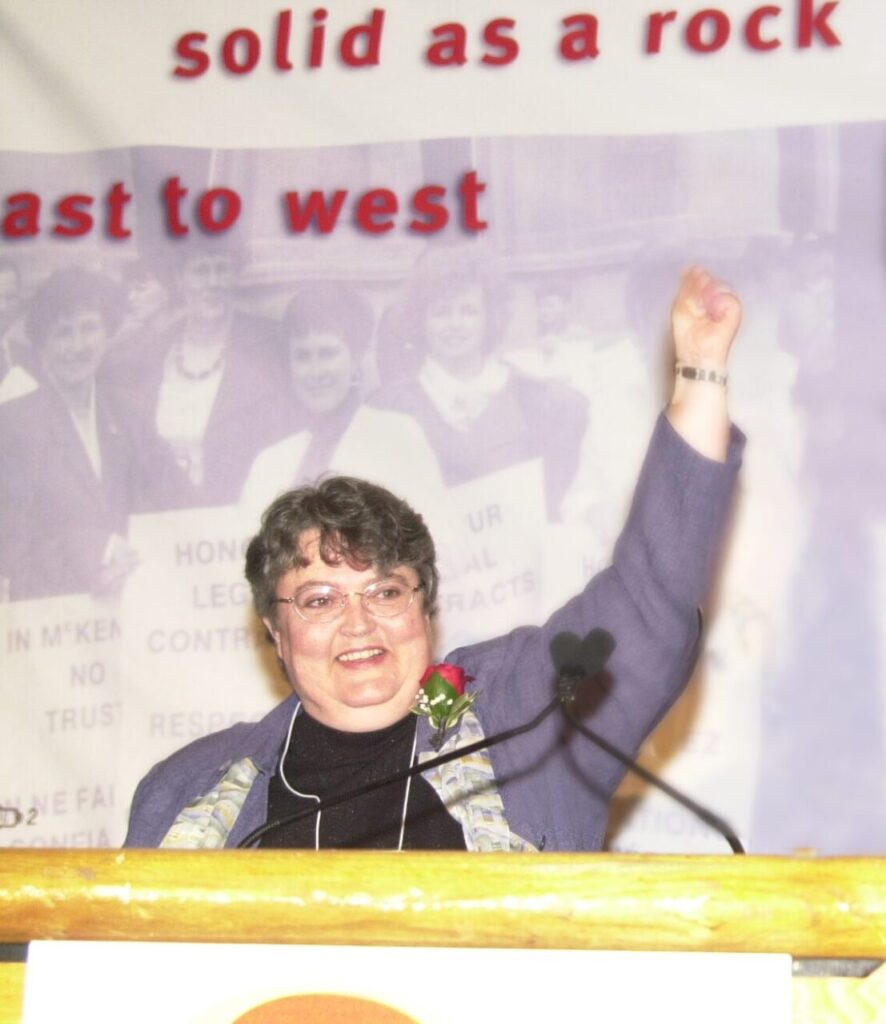
Biennium delegates honoured the memory of nursing advocate and former CFNU president Kathleen Connors Thursday afternoon. In a moving video narrated by current CFNU President Linda Silas, some of Connors’ many colleagues and admirers recalled her strength, courage and occasional quirks – such as chairing a CFNU meeting in her dreams.
“She spent her life lifting others up, nurses, patients or different communities,” Silas said in the video. “In doing so, she became one of Canada’s most respected voices in the labour movement.”
The daughter of a Manitoba farm family, born on May 5, 1952, Connors was president of the CFNU for more than two decades. Her tireless advocacy began soon after graduating from nursing school at St. Boniface Hospital in 1972. She went to work in Thompson, Man., where Manitoba’s first nursing union was certified.
She helped draft the constitution of the National Federation of Nurses Unions and was a delegate at the 1981 convention that led to the creation of the now-CFNU. She was elected president of the NFNU in 1983, which took her to Ottawa.
“She stepped into national leadership at a time when nurses were fighting for pay equity, workplace safety and respect,” Silas said.
Pauline Worsfold, former CFNU secretary-treasurer, said Connors often reminded nurses that “politicians don’t change their minds because they see the light, they change their minds because they feel the heat!”
Connors’ daughter Kara, invited to the microphone by Silas, told delegates her mother always advised: “Don’t let the CEOs tell you, don’t let the board chair tell you, and certainly don’t let politicians tell you – you’re the experts!”
After retirement, Connors moved to Pouch Cove, N.L., where she continued advocating as chair of the Canadian Health Coalition.
Silas said the CFNU has committed $10,000 a year to a $1,000 Kathleen Connors Bursary in each province to educate nurses for work in rural and remote areas.
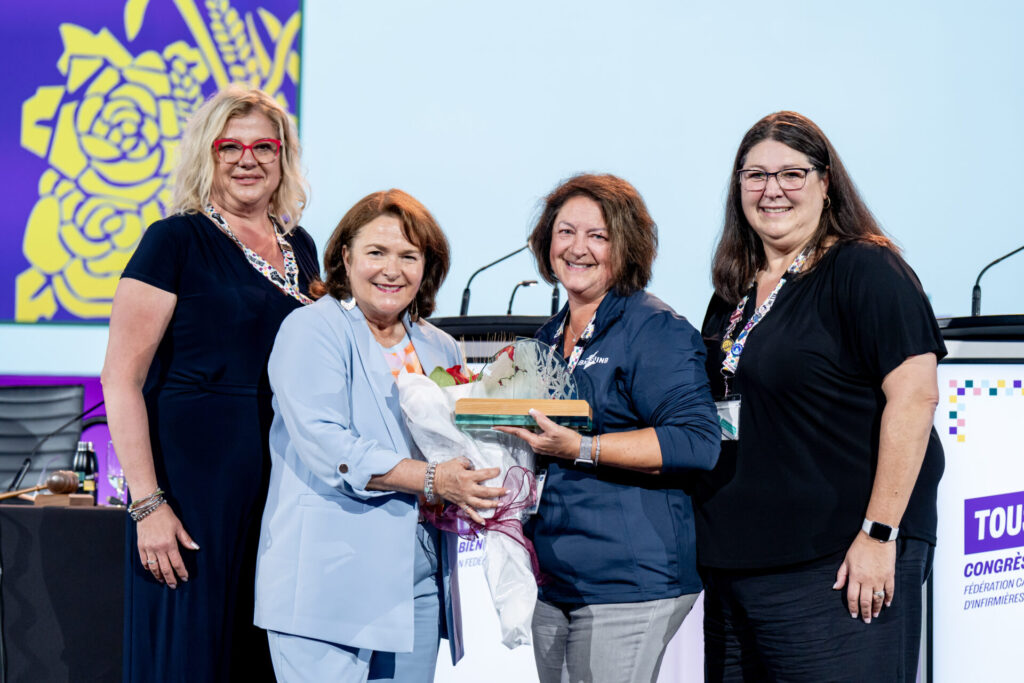
Day 4 of the convention ended on a note of pride and celebration as the CFNU honoured four of Canada’s nursing activists with the prestigious Bread & Roses Awards for 2024 and 2025.
Awards were presented to Tania Dick, Indigenous Nursing Lead at the University of British Columbia; Doug Anderson, Senior Advisor to the President and Board of Directors for the Ontario Nurses’ Association; Maria Richard, 1st Vice-President of the New Brunswick Nurses Union (NBNU); and Paula Doucet, NBNU President.
The CFNU Bread & Roses Awards are given yearly for outstanding contributions to health care policy and decision-making, and for raising public awareness of nursing issues and patient advocacy.
Recipients wove a tapestry of stories, solidarity and gratitude in their acceptance speeches. Tania Dick, reflecting on her pivotal role in CFNU’s apology to Indigenous, First Nations, and Métis peoples, spoke from the heart.
“I’m so proud of each and every one of you for witnessing that apology,” she said. “The words I shared with you that day filled my whole cup, and I know that every time I come to these gatherings, there is a growing army of nurses willing to stand with us.”
Many in the room were moved to tears as Maria Richard accepted her award with humility, grace and a few tears of her own.
“This award is not mine,” she said. “It belongs to the NBNU members that I work for and that I work with.”
The Bread & Roses Award is named in honour of the pioneers who fought for women’s suffrage and women’s workplace rights and dignity. The term is believed to originate from a 1912 textile workers’ strike in Lawrence, Massachusetts, in which the strikers demanded: “Give us bread, but give us roses.”
Bread and roses have since become a powerful symbol for the worldwide labour movement and for the CFNU nurses who work tirelessly to bring positive change to the nursing profession and Canada’s public health care system.
“Nurses are the heartbeat of the system,” said Dick. “When we talk about transformational change in the health care system, I know that the best people to accomplish that change are nurses.”